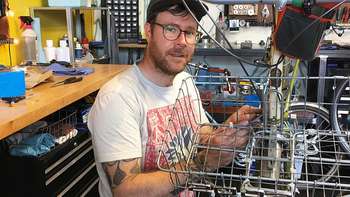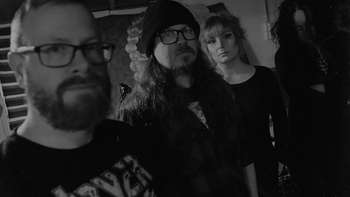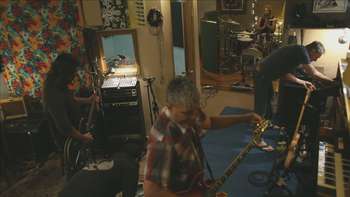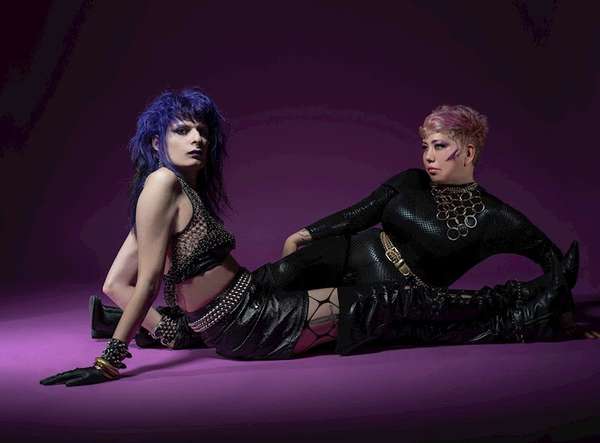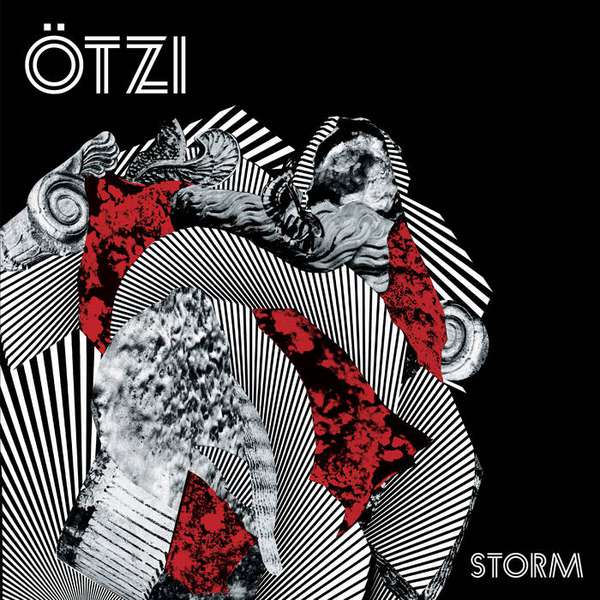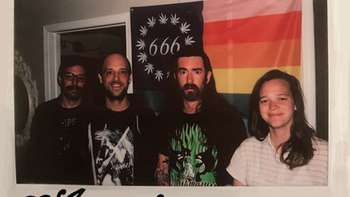There are a lot of misconceptions about the life of a musician. The old rock star image of packed arenas, traveling with an entourage, and crazy backstage antics is almost patently false. Sure, it’s reflective of a few artists from yesteryear who have platinum records and shortened lifespans, but most musicians have day jobs – and not just to pay the bills. Jobs provide new challenges, personal fulfillment and, yes, some rent or gas money.
And usually when somebody is writing a new record or scheduling a tour, they have to balance that with their job.
How an artist spends their time by day will influence the creative process at night. In Don’t Quit Your Day Job, Scene Point Blank looks at how musicians split their time, and how their careers influence their music – or, alternately – how their music provides escape.
In this installment we chat with Akiko Sampson, bassist and vocalist in Ötzi, who will release Storm on May 22 via Artoffact Records. Fan her work as 1980s-tinged post-punk that's equally dark and passionate. In this piece, we get to know about Sampson’s day job as Compliance Manager in the marijuana industry.
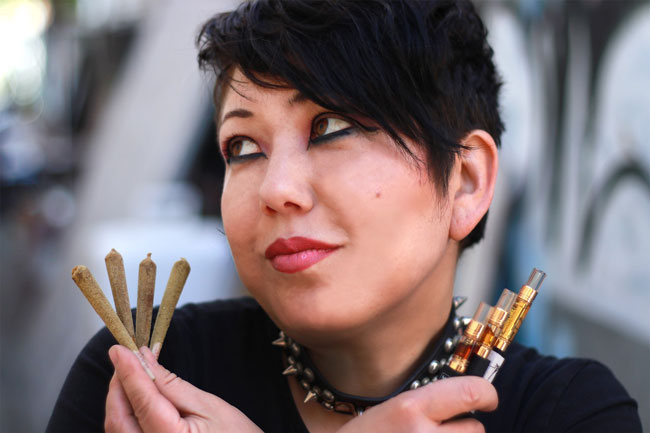
Photo: Michael Dadonna
Scene Point Blank: I hear your day job is working at a "weed factory." What does that mean, exactly? What is your official job title?
Akiko Sampson: The weed company I work for makes pre-rolled joints, CO2 distillate vape cartridges, live resin cartridges, and sometimes edibles. My title is Compliance Specialist. I track product manufacturing and register each production step with the state’s cannabis control board.
I also double as Creative Director when we’re coming up with new products to market, so then I design packaging and advertising campaigns with the R&D and marketing teams.
Scene Point Blank: How did you end up at this job? What was your career trajectory like leading up to this? Do you have a degree in a specific field?
Akiko Sampson: I applied here after leaving another, more entry-level, weed job where I worked on the production floor. I actually went to graduate school for plant biology and switched to microbiology, so I have some relevant knowledge. But, really, you don’t need any of it. I do love weed as a plant and wanted to do research on cannabis genetics, but it was too difficult to do when I was in graduate school, being against federal law and all. I’m happy I get to work with weed now.
Scene Point Blank: Were you working in creative or compliance roles at previous jobs?
Akiko Sampson: I’ve done way more graphic design than compliance work, and I used to work on advertising campaigns for cosmetics companies and I worked in the art department at a lot of magazines.
Scene Point Blank: Have you been in bands as your career has progressed? (In other words, how does your resume correspond or overlaps with being a musician?)
Akiko Sampson: I’ve always prioritized music and art over my job, so I tend to go for jobs that are freelance or flexible in nature.
Scene Point Blank: What’s the biggest challenge in balancing your career with your music?
Akiko Sampson: The biggest challenge is not biting off more than I can chew, trying not to overcommit to everything, and falling into exhaustion or making myself sick trying to make the next deadline for music stuff while working.
I also have a record label on the side called Psychic Eye, so I get into weird cycle overlaps where I have to be promoting another artist’s work at the same time as I’m getting ready for tour or wrapping up Ötzi stuff.
Scene Point Blank: Is there a busy or slow season in your work? Does that influence your music schedule in any way?
Akiko Sampson: It actually changes day to day more than it changes by season, which is typical for indoor grown or farm outsourced brands. If you’re involved with outdoor growing or harvesting, there’s definitely more seasonality. The weed industry, despite taking in a lot of money, is also always in on its toes and overworked because of changing regulations and changing trends. So it’s good to have some strategy, but also not take it too seriously. I try not to let it affect my music schedule at all.
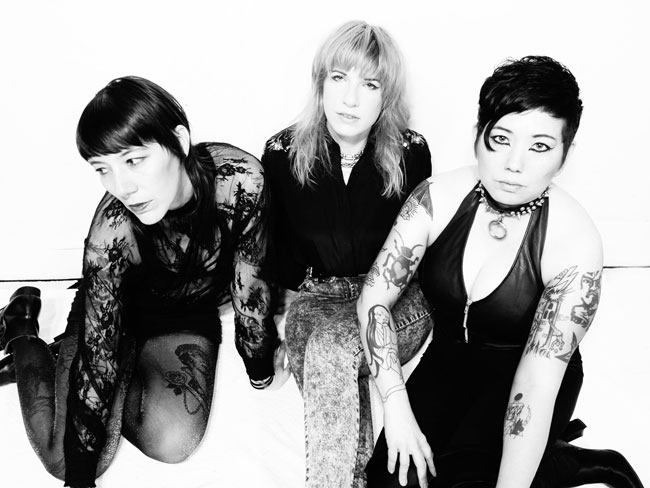
Photo: Kevin Brown
Scene Point Blank: Have your experiences from making music or touring influenced your career in any surprising ways?
Akiko Sampson: I was in school for microbiology and pursuing a PhD, but at the last minute I chose against a PhD and opted for a master’s degree instead. I didn’t really fit into that industry personality wise, and I’d lost interest in it.
After meeting people around the world touring, I’ve had a few people tell me my band changed their life. That’s something I’ve never heard anyone say about my science! So after 10 years of school, I decided against a science career and prioritized music instead. It’s more fulfilling to me; I enjoy making other people happy and feeling connected.
Scene Point Blank: Are your coworkers aware of your music?
Akiko Sampson: A few are. I try not to talk about it at work much because it usually opens a can of worms!
Scene Point Blank: What do you mean by that?
Akiko Sampson: Well, we like to keep our shows safe for trans people, women and younger kids when it’s all ages, so while we like to have a welcoming environment, it’s not actually welcome to everyone. We think subcultures are subcultures for a reason, so no -- we don’t want Brad from accounting to become our biggest fan.
Scene Point Blank: I imagine in the weed industry there are more music fans than in some other fields. Are your coworkers musicians too?
Akiko Sampson: On my first day of the job I ran into someone from Ötzi! A previous guitarist who went on a tour with us to Europe worked in production, and I didn’t even know it! We had a big hug.
And yes, there are lots of music fans, especially lots of rap fans. I also know a lot of punks that camp up in Humboldt and harvest weed in the fall.
Scene Point Blank: What advice would you give to others who might be interested in working in either the developing weed industry or alternately in creative direction-type work?
Akiko Sampson: For weed, just do it. If you’re even moderately competent you’ll probably get hired somewhere. Look for the places that are always hiring and start there. Mostly employers just want to know that you understand something about that industry and can deal with all the eccentricities.
For creative direction, well that’s just a fancier word for a graphic designer. For anyone starting out in that, I would just say don’t take on freelance projects that don’t actually interest you. You’ll probably be taken advantage of financially and won’t even have any cool work to show for it.
Scene Point Blank: It sounds like you keep busy and also run a label, produce videos, and teach vocal lessons?
Akiko Sampson: Yes, I do what I can! The label, Psychic Eye, is small and is meant to be small. I like to only put out a few records a year that I really stand behind and can focus on. I produce videos for Ötzi and for other bands as well, and that’s super fun but gets way more obsessively involved than any of my other work. Since the pandemic broke out, I also added a webzine, Cryptic Species, to my projects. I like that because I get to have honest and meaningful conversations with other artists and activists, and I get in a bit of the socializing that I used to get from going to shows. And I get to promote other artists’ work that might not be a good fit for my record label, but who I’m a big fan of.
Scene Point Blank: Have any of these projects had a direct impact on your upcoming record?
Akiko Sampson: Only the video production had a direct impact on the record. We didn’t want to schedule the record release until we had some videos to share, and that was a bummer because I was the hold up! But it’s cool being a video director because my band gets to have a lot of input into the videos instead of us hiring an outside person, who might not have a shared vision.



